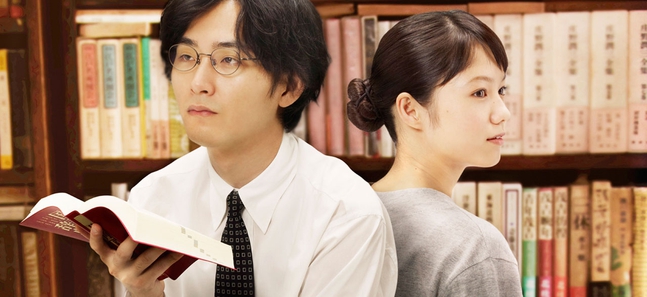The Great Passage (Fune wo Amu)
Yuya Ishii’s tale of a dictionary maker in love is genuinely charming

© 2013「舟を編む」製作委員会
Posted: Fri Apr 12 2013
Director: Yuya Ishii
Starring: Ryuhei Matsuda, Aoi Miyazaki, Joe Odagiri
Time Out rating: 
The tedious editorial tasks of proof reading, cross-checking and filling out index cards have seldom been depicted as heroically as they are in The Great Passage, Yuya Ishii's adaptation of the bestseller by Shion Miura. Spread across a 15-year timespan, this warm, immensely likeable film follows the efforts of a small group of editors trying to produce a dictionary to rival the Kojien and Daijirin, Japan's OED and Merriam-Webster. Our hero, Majime (Ryuhei Matsuda), is the kind of character who'd be relegated to a walk-on part in most other films: a bespectacled, po-faced bookworm whose dense vocabulary is rivalled only by his dearth of social skills. When a veteran colleague cautions that the Daijirin took 28 years to make, he seems to take it as an encouragement; yet when he gets the hots for his landlady's dishy granddaughter, Kaguya (Aoi Miyazaki), he's entirely at sea.
Miura's novel was praised for managing to make this arcane universe so compelling, picking up the coveted Japan Bookseller's Prize last year, but its subject matter doesn't seem like the easiest thing to adapt for the screen. So it's to its credit that The Great Passage is most enjoyable when it's stuck in the dictionary makers' world of book shelves and Excel sheets. Though Miura is the daughter of a well-known Japanese classics scholar, there aren't nearly as many linguistic in-jokes as you might expect: Majime lands the job by successfully defining the direction ‘right’ (think about that one for a second), while his group's aim to create a ‘living’ dictionary finds them eavesdropping on schoolgirls to get the latest slang, rather than fussing over the etymology of Heian-era vocabulary. The will-they-won't-they romance between our über-nerd hero and his dream girl is rather less interesting in comparison. Miyazaki suffers in an underwritten role that, for the most part, gives her little to do except be quietly supportive and make tasty-looking sashimi – the one exception being a barnstorming midpoint scene that had me smiling for weeks afterwards.
Following the ghastly misfire of 2011's Mitsuko Delivers, Ishii has returned to form here, while delivering his most conventional – and commercially viable – film to date. The Great Passage lacks the spikiness of earlier indie dramedies like Sawako Decides and A Man With Style, but it shares their deadpan humour and generosity of spirit. In tone, it sometimes resembles one of Juzo Itami's less manic films: a wry, gently amusing celebration of ordinary people locked in a glorious endeavour.
The Great Passage opens nationwide on April 13
Tweets
- About Us |
- Work for Time Out |
- Send us info |
- Advertising |
- Mobile edition |
- Terms & Conditions |
- Privacy policy |
- Contact Us
Copyright © 2014 Time Out Tokyo














Add your comment